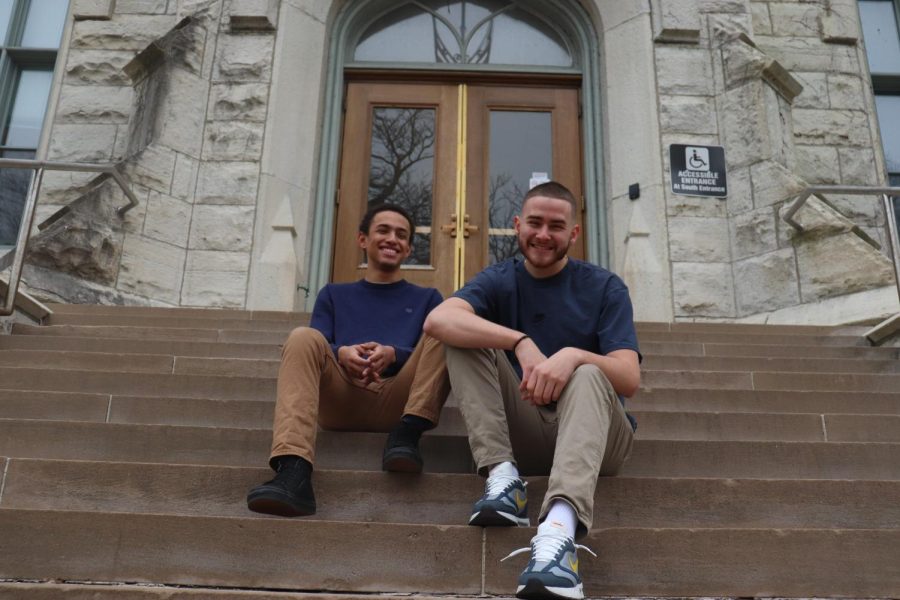Jason Hegelmeyer and Donovan Cusick win ASG presidential election
Jason Hegelmeyer and Donovan Cusick. The pair have won the 2022 ASG presidential election.
April 16, 2022
Weinberg junior Jason Hegelmeyer and SESP sophomore Donovan Cusick have won the Associated Student Government presidential election with over 70% of the vote.
The slate won 1,385 of the 1,950 total votes cast. Hegelmeyer and Cusick’s opponents raked in 529 votes, while 36 students submitted a vote of no confidence, according to Election Commission Chair Jo Scaletty. The number of votes cast increased from last year’s 1,353 total votes, is down from 2,064 in 2020 and higher than the 852 in the uncontested 2019 election.
Both students will be sworn in during Wednesday’s Senate meeting. Hegelmeyer said addressing the recent surge in COVID-19 cases will be a priority during the slate’s first weeks in office, along with determining the ASG executive board.
“We want to make sure (personal protective equipment), specifically KN95s, are available for students when they need it, which is now,” Hegelmeyer said. “If we could talk to the University about getting some sort of testing, at least for the time being while cases are spiking, that will probably be necessary.”
Hegelmeyer and Cusick have both served on ASG since their respective freshman years, with Hegelmeyer currently serving as chair of the Campus Life Committee and Cusick as ASG’s chief of staff. Ahead of its victory, the Hegelmeyer-Cusick campaign announced endorsements from eight student groups, including For Members Only, the Middle Eastern and North African Student Association, Alianza, the South Asian Students Alliance and the Rainbow Alliance.
Hegelmeyer has also previously served as FMO senator and worked to pass legislation to permanently instate a Senate seat for FMO. Prior to this, the organization had to reapply for a Senate seat every year.
In their four-pillar platform, Hegelmeyer and Cusick pledged they would work to improve University accommodations for the COVID-19 pandemic and services for students holding marginalized identities. They also outlined several points of improvement for campus life, such as improving dining hall options, expanding gender-neutral bathrooms and reassessing Winter Quarter start dates.
Drawing on their previous experience speaking with administrators, Hegelmeyer and Cusick said they would work to make President-elect Rebecca Blank aware of student demands.
“A big priority of ours is going to be getting in contact with administration, President Blank and President Schapiro, and talk to both of them and figure out what the transition is going to look like — not just for us, but for the University as a whole,” Cusick said.
The pair beat out Weinberg junior David Grow and Weinberg sophomore Camila Vicens for the positions. One day before voting closed, the Grow-Vicens slate had incurred three strikes for violation of election policy and faced removal but successfully appealed a strike for “lack of mutual respect” and remained on the ballot.
However, Grow and Vicens retained strikes for pre-campaigning and defamation of the opposite slate. Hegelmeyer and Cusick also incurred a strike for lack of respect in reference to general social media behavior, according to the election commission.
Scaletty said navigating the violation reports were difficult because the election code was written before social media played a major role in ASG election. Anonymous comments about the candidates that ranged from mean-spirited comments to harassment appeared on platforms like YikYak throughout the election, Scaletty said.
Re-examining social media policy will be a priority as the commission conducts a post-election review of the code and submits revisions for Senate consideration, they added.
“Something we’re going to be thinking about is if there is any possibility for us to make sure that the students involved in the election are protected,” Scaletty said. “As far as looking on personal social media of candidates, (we will be) figuring out clear guidelines for what sort of language is and isn’t okay.”
Hegelmeyer and Cusick have pledged to create a student group liaison on ASG’s executive board and support student activist groups in seeking Senate representation.
Throughout the election, the opposing slate noted that ASG has limited visibility and students are seldom aware of its work. Increasing student awareness of the body will also be a priority, Hegelmeyer said.
“(ASG) does fund pretty much every single organization on campus, so people may not know, but they interact with ASG in some shape or form,” Hegelmeyer said. “That’s why it was really good to be on the campaign trail, getting to talk to all these student groups, because that was probably more engagement than ASG has done in a long time.”
This article has been updated to include comment.
Email: [email protected]
Twitter: @maiapandey
Related Stories:
— Associated Student Government presidential candidates square off in Tuesday debate
— Meet ASG presidential candidates Jason Hegelmeyer and Donovan Cusick


